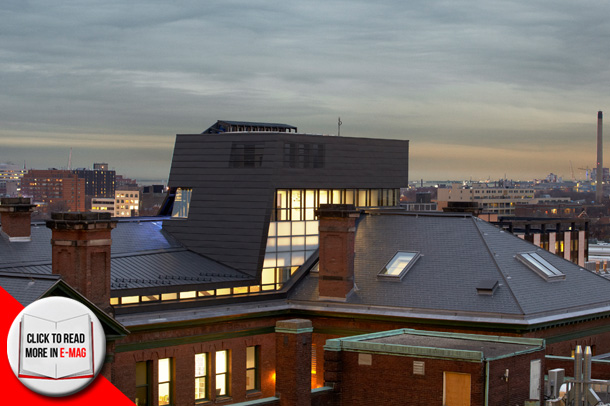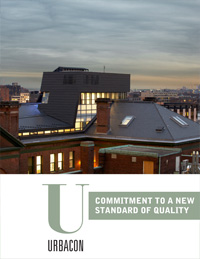By Cheryl Long
Describing Urbacon as a construction and real estate development company barely does justice to the organization’s breadth of creativity and talent. Even a cursory scroll through their past projects, from mesmerizing glass structures to stunning interiors, quickly reveals that Urbacon is in the business of creating lasting impressions.
It was a very different company that the Mancini family started when it was a small operation – less than 10 employees at a location on Berkeley Street in Toronto in 1984. Four years later, they relocated to Lower Sherbourne Street with a growing roster of about 20 people and an eye on a future that would expand beyond workplace interiors. Today, Urbacon’s Toronto office on Lake Shore Boulevard East is a testament to the company’s unique vision.
“Our President Marco Mancini has taken the company to what it is right now … over 125 employees and approximately 250 million dollars a year in work,” said Raffaele Barone, the company’s Vice-President of Operations. Mancini is “the driving force of this company … that’s really where our inspiration comes from. Our engine is him.”
Respected across Canada
The privately-owned company prides itself on a solid reputation for construction and project management excellence across Canada. Their two additional offices in Montreal and Vancouver allow Urbacon to service their clients nationally with locally-based, custom teams specializing in five areas: Buildings Group, Data Centre Solutions, Corporate Interiors, Infrastructure and Civil Works, and Properties and Development.
Entrepreneurial spirit and passion are two of the forces behind Urbacon’s success, but a certain amount of daring and a willingness to push the envelope hasn’t hurt their rise through the industry.
“One of the reasons we got here is we took on some large projects, some of the most challenging projects of the time,” Barone explained. “When you take on and complete large and aggressive projects, you get rewarded.”
One of those projects back in 2002 was the new Terminal 1 building at Toronto’s Pearson International Airport, where Urbacon managed the construction of over 700,000 square feet of government , agency and tenant spaces for the Greater Toronto Airport Authority and Air Canada, including Air Canada’s Maple Leaf lounges, V.I.P Lounges, a 500-staff cafeteria, Canada Customs and Immigration Area, U.S. Border and Immigration, Aviation Museum, Chapel, Flight Operation Centre, and multiple office spaces.
Celebrating 30th anniversary
Thirty years ago, Urbacon was launched as a corporate interiors company. Today their integrated business model covers the spectrum of construction, creating a one-stop shop for their clients. Services include the purchase and development of real estate properties; design-build, general contracting and construction management; the development, construction and maintenance of data centres; infrastructure and civil works projects; and commercial interiors. The business model not only allows Urbacon to provide a vast range of services to their clients, but allows them to generate their own work from one end of the company to the other.
“We’re very uniquely situated in the marketplace,” Barone said. “Other general contractors may be very one dimensional; for example, they may only build. We have in-house professionals … we can take you from pen and paper all the way to keys.”
The company’s planners are on hand to assist with city approval processes and then an architectural team steps in to work on design. Construction managers oversee the efforts that bring the design to life and, if needed, Urbacon can provide maintenance specialists to assist with the facility’s operations. With input from so many departments – that extends to local architectural and engineering consultants as well – the company strictly follows a S.P.O.C protocol: single point of contact. That means information is funnelled to and from the client through one specific person, which is particularly important to the larger data centre clients, Barone explained.
It isn’t difficult to find Urbacon’s stamp in and around Toronto. Their work is evident in so many of the city’s eye-catching structures: the CityTV–OMNI broadcast building at Yonge and Dundas Square, BMW’s corporate headquarters along Hwy 404 in Richmond Hill, the flagship Mini dealership downtown and the sleek Umbra concept store in the Queen West shopping district, just to name a few. That reach goes national with projects like the renovation of CN Rail’s head office in downtown Montreal, the J.P. Morgan Chase Bank call centre in Vancouver and the new Bell Canada Data Centre facility in Gatineau, Quebec. It’s gratifying to have made a mark on the country’s architectural scene.
“That’s actually the most rewarding thing, when you can drive by 10 years later and point and go, ‘Hey, we built that’,” Barone said. “When you sit back and look at how Toronto¢s landscape has changed and you’ve contributed to that landscape change, it’s very exciting.”
And the winner is …
Urbacon is no stranger to accolades. They’ve received numerous awards, including the recent 2014 Canadian Green Building Award for their work on the Goldcorp Mining Innovation Suite in the Lassonde Mining Building at the University of Toronto. The prestigious award is handed out annually by the Canada Green Building Council (CaGBC) and Sustainable Architecture & Building magazine, and recognizes excellence in sustainable, high-performance building design, architectural merit and technical innovation.
Urbacon was the general contractor on the project, working with Architects Baird Sampson Neuert to transform previously unused attic space in the historically designated building into a modern laboratory and design studio. Luc Proulx, Senior Project Manager at Urbacon, led the team through the conversion that now houses working space for up to 125 undergraduate and graduate students on U of T’s downtown campus.
“It’s an old wood beam construction in that attic and the roof is fairly heavy. The top members of the truss were supported by columns back to some load-bearing masonry partitions within the building on the lower floors, and once that was reinforced we took out the bottom cord so it really opened up the spaces,” Proulx explained. “We had to reinforce the joists, add a new sub floor, new flooring, we added some skylights, and added washrooms and some grad offices for them to work in.”
A new elevator running from the basement to the fifth floor, an exterior wall atrium, and a teleconference room perched one floor above the attic space were part of the renovation. “It’s resting on the masonry walls that support the roof,” Proulx said. “It was interesting to work on top of that space and make it all work.”
The $22-million project was not without its challenges, particularly since several of the building’s floors remained occupied by students. But the Urbacon team was proud to have brought the architectural vision for the building to life, and the award is a welcome acknowledgement of their efforts.
“It makes it all worthwhile. You don’t get that very often … to be recognized for all the efforts that were put into a project,” Proulx said. “It means a lot to the team that was there. In the end it really looked great …”
Creating a sense of family
Building and encouraging a strong sense of team is part of the Urbacon culture. They’re more than a group of employees; they’re a family that works, plays, struggles and celebrates together. “…we don’t make any widgets, we don’t make a pen, we don’t make something on an assembly line. What we do is we sell professional construction services,” Barone explained. “The only way you can sell a service and believe in that service is if everyone feels that they’re involved in a greater cause.”
That means allowing team members the autonomy to explore all aspects of the business, providing opportunities for skill development and advancement, and fostering a sense of pride in their work.
“It’s all about our family approach to people that work here. If you can integrate everyone into the family approach, you see that people have a vested interest in the company growing, and the better the company does, the better they do,” Barone said. “By investing in people, you’re reinvesting in our company.”







